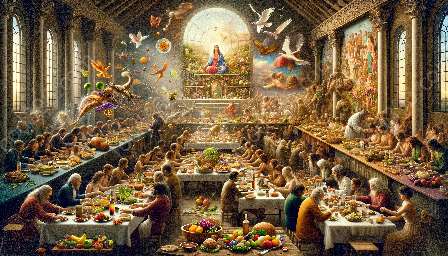Food not only sustains our bodies, but it also plays a critical role in shaping our identities and social structures. Throughout history, food has been deeply intertwined with cultural traditions, social hierarchies, and individual sense of self. This article explores the complex connections between food and identity, delving into how food reflects and shapes our social structures, cultural histories, and personal identities.
Food and Identity
Food is a fundamental component of personal and cultural identity. The foods we consume often reflect our cultural backgrounds and individual preferences. For many people, certain dishes evoke memories of family gatherings, childhood experiences, and cultural heritage. Additionally, the way we prepare and consume food can be deeply tied to our sense of self, fostering a connection to our cultural roots and traditions.
Food and Social Structures
Food plays a crucial role in defining social structures and hierarchies. Throughout history, access to certain foods has been closely linked to social status and power. The availability of specific ingredients, as well as the ability to prepare elaborate dishes, has often been a symbol of wealth and privilege. Furthermore, communal meals and food-sharing practices can reinforce social bonds and hierarchies within communities, showcasing the significance of food in establishing and maintaining social structures.
Food Culture and History
Food culture is shaped by historical events, migration patterns, and societal changes. The culinary traditions of a particular region often provide insights into its history, reflecting the influences of various cultures, trade routes, and environmental factors. Exploring the historical roots of different cuisines not only enhances our understanding of cultural diversity but also showcases how food has evolved over time, adapting to new circumstances and influences.
The Diversity of Food and Identity
Food serves as a powerful tool for preserving and expressing cultural identity. From traditional recipes passed down through generations to modern fusion cuisines that reflect global interconnectedness, food encapsulates the diverse experiences and identities of individuals and communities. The fusion of ingredients and flavors in contemporary food culture reflects the constantly evolving nature of identity, embracing the complexities of multicultural societies and global exchange.
Foods and Social Rituals
Social rituals surrounding food, such as communal feasts, religious celebrations, and seasonal gatherings, further reinforce the bond between food and social structures. These rituals often define the rhythm of community life, offering opportunities for social interaction, solidarity, and the reinforcement of collective identities. Additionally, the symbolic meanings attached to certain foods within these rituals contribute to the construction of social hierarchies and values within communities.
Food as Historical Documentation
Exploring the historical documentation of food traditions provides a deeper understanding of cultural histories and societal structures. Recipes, culinary techniques, and food-related artifacts offer valuable insights into the customs, beliefs, and livelihoods of past generations. By studying the evolution of food culture, we can uncover the ways in which historical events, economic shifts, and social dynamics have shaped the culinary landscape and influenced the construction of identities.
Conclusion
The nexus of food, identity, social structures, and cultural history is a rich and multifaceted tapestry. By examining the intricate connections between food and identity, we gain a deeper appreciation for the ways in which food reflects and influences our social structures, cultural histories, and personal identities.

